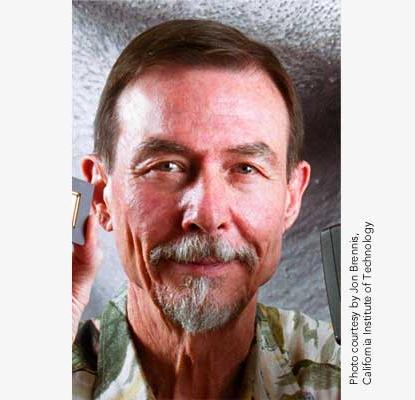Carver Mead
A trigonometry book and electrical equipment from a power plant was all Dr. Carver Mead needed to whet his appetite for math and physics as a child. Traversing the Sierra Nevada Mountains to attend the California Institute of Technology as a young adult, Mead embarked on a lifelong journey in physics and microelectronics—where he would revolutionize the semiconductor industry with very-large-integrated circuits. In 1999, he was awarded the $500,000 Lemelson-MIT Prize.
A computer automation pioneer, Mead challenged the 1960s belief that a chip's transistor could not be smaller than 10 microns. In his 1969 design concept for VLSI (very-large-scale integrated) circuits, Mead proved that transistors could be as small as .15 microns. This design was eventually adopted among all semiconductor companies and has resulted in a variety of new microchips.
Mead also laid the foundations for the Information Age with his gallium-arsenide transistor, which evolved into HEMT—the universal amplifying device in microwave receivers used in a myriad of telecommunication systems.
A trailblazer in neuromorphic electronic systems, much of Mead's work builds off of the principle of modeling systems according to the functions of the human nervous system. One such derivative is the touch pad—products that are altering the user interface to computers.
In 1999, as chairman and founder of Foveon, Inc., he designed a new digital camera with image sensors set in silicon to capture each pixel color—red, green and blue—producing better quality photos than today's cameras that only detect one color.
A native of Big Creek, CA, Mead received his BS (1956), MS (1957) and PhD (1960) in Electrical Engineering from the California Institute of Technology. Born in 1934, Mead has been teaching since he received his M.S. and is now the Gordon and Betty Moore Professor of Engineering and Applied Science at CalTech. As a Professor, Mead has collaborated on several of his 50+ patents and 100+ scientific papers with his students—returning the inspiration and learning that guided him through the years from his school teachers, father and CalTech Professors Linus Pauling and Richard Feynman, both Nobel Laureates.
A fellow of the American Physical Society and member of the National Academy of Engineering, Mead has received an honorary degree from the University of Southern California and an honorary doctorate from the University of Lund, plus awards, including the Harry Goode Memorial Award (1985).


